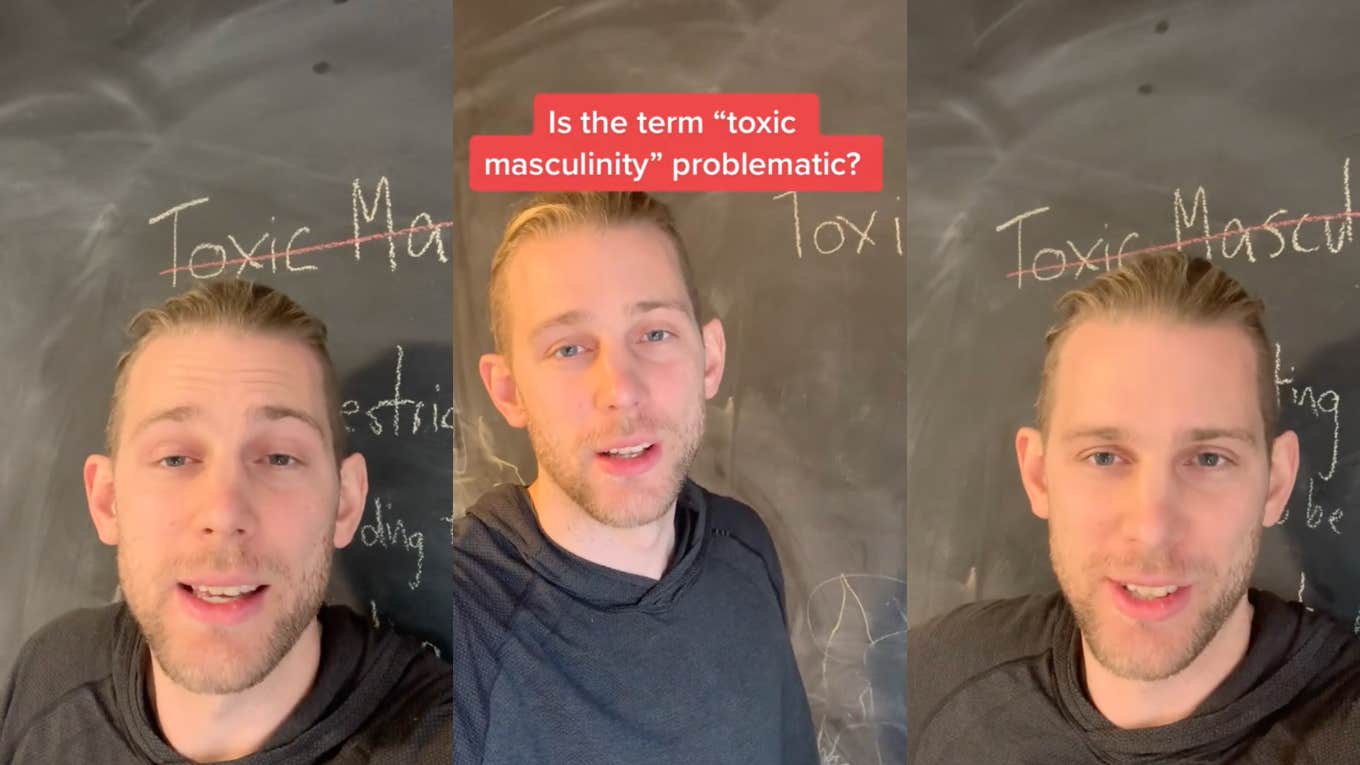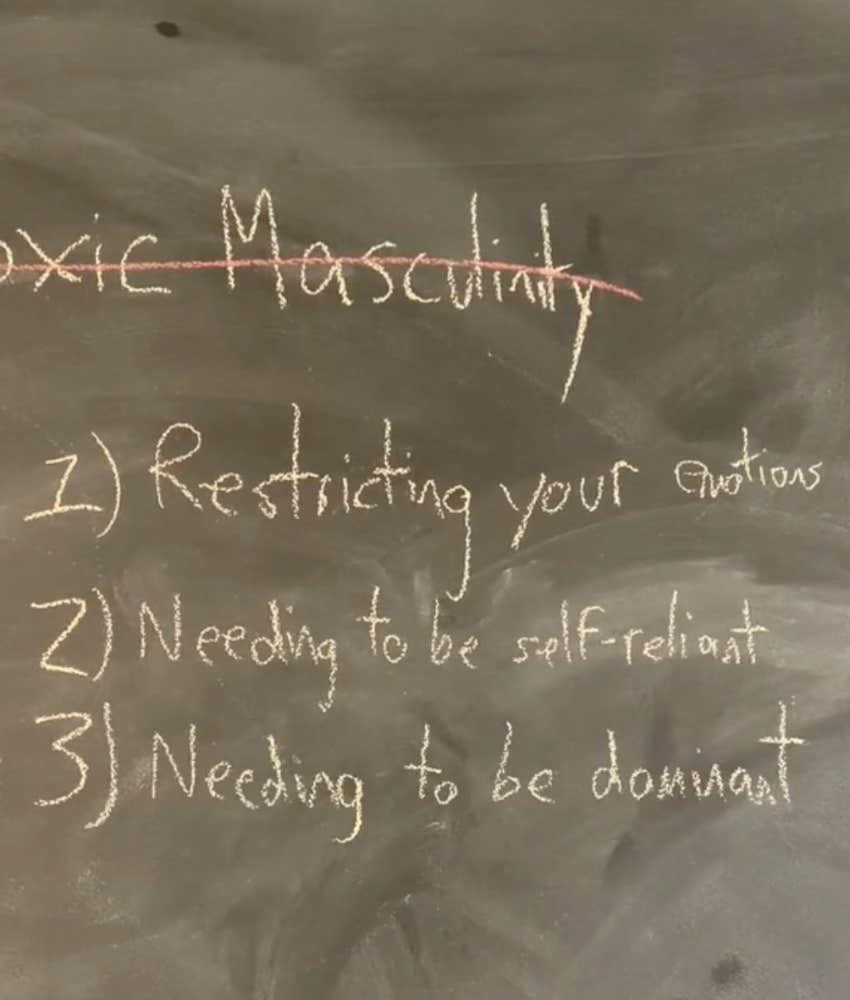Teacher Explains Why He Prefers Not To Use The Term 'Toxic Masculinity' & What We Should Be Saying Instead
"I think the label 'toxic masculinity' obscures all of this important complexity."
 @remasculine / TikTok
@remasculine / TikTok A teacher who studies and researches masculinity at the Ph.D. level explained why a common term that most people use to describe the traditional values of masculinity should be replaced with something more inclusive.
In a TikTok video, Brendan Kwiatkowski, a gender and education teacher, provided information about the correct way to approach discussions about gender expectations and societal pressures put on young boys.
He explained why he doesn't use the term 'toxic masculinity.'
"This is why I do not like or use the term 'toxic masculinity' and what term I think should replace it," Kwiatkowski began in his video.
He prefaced by admitting that he isn't personally offended by the term, even though some others are, but claimed that for him, he doesn't think the term clearly identifies the root of the problem and actually makes it harder to see and find the solution.
He explained that seeing something as toxic doesn't always mean that it is harmful, breaking down the three aspects of masculinity that are fairly common effects of the patriarchy and are considered to be the most harmful.
"We have restricting your emotions, needing to be self-reliant, and needing to be dominant," Kwiatkowski continued. "Is it safe to say that these three things are toxic? No, not all the time, especially the first two. I'm happy to concede that the third one is pretty consistently problematic, so I'm not gonna defend that."
He acknowledged that, for the most part, people aren't usually motivated to do something because they're harmful, but do things because they're adaptive or protective to them in their environment, which Kwiatkowski said was the case during his Ph.D. research about teen boys and why they will often restrict their emotions.
With context, many young boys often feel the need to suppress certain emotions because they may not have grown up in a safe space where they were allowed to be their authentic selves.
"Some boys became self-reliant because that was a way that they could protect their younger siblings and care for them after their parents' divorce, even though they ignored their own needs in the process," he said, providing an example.
Kwiatkowski found that many young boys who were self-reliant avoided traditional masculine pressures from peers.
He pointed out that in these contexts, it's not exactly toxic versus non-toxic, explaining that during his research he often found that "some boys' masculine self-reliance actually served to help them reject other masculine peer pressures."
"So I think the label 'toxic masculinity' obscures all of this important complexity. The better question to ask is, when can some behaviors and beliefs associated with masculinity be harmful? My simplest answer is when it disconnects you from your authentic selves or dehumanizes others."
Kwiatkowski clarified that the aspects of masculinity that would be harmful would be when it places rigid restrictions on who you are and what you can do, or if it places rigid restrictions on who other people are and what they can do.
 Photo: @remasculine / TikTok
Photo: @remasculine / TikTok
Instead, Kwiatkowski suggests that we should use the term 'restrictive masculinity.'
Kwiatkowski explained that the term "restrictive masculinity," which was first coined by Dr. James O'Neil in 2015 under the phrase "restrictive masculine ideologies," is more inclusive and gets to the root of the issue — which is that many young boys do feel these emotions, but they are either just taught to restrict them or do it on their own to fit in with the harmful aspects of masculinity.
"This is why I suggest the term 'restrictive masculinity,' because the term identifies what can be harmful and offers a clear path forward toward less restriction."
As Kwiatkowski mentioned in his video, the term toxic masculinity can be seen as overly broad and may inadvertently stigmatize all aspects of traditional masculinity. It implies that all expressions of traditional masculinity are inherently harmful, which is not the case.
So, by using "restrictive masculinity," the focus shifts away from demonizing masculinity as a whole and instead identifies certain limitations or constraints placed on men.
Some examples of attributes that are often associated with toxic masculinity include leadership qualities like confidence, assertiveness, and decisiveness, but these traits can be valuable when applied with empathy, inclusiveness, and a commitment to unite rather than dominate.
On Kwiatkowski's website, "Re: Masculine," whose mission is to "empower boys and men to connect with their emotions and others in healthy and healing ways," he described how there is nothing wrong with men participating in stereotypical masculine things, but acknowledged that there are certain beliefs and behaviors associated with masculinity that are harmful.
Not all men conform to the same set of expectations associated with traditional masculinity, and by using the term "restrictive masculinity," it acknowledges that there is diversity in how individuals express their masculinity and that there should be space for multiple expressions of gender.
Nia Tipton is a Chicago-based entertainment, news, and lifestyle writer whose work delves into modern-day issues and experiences.

